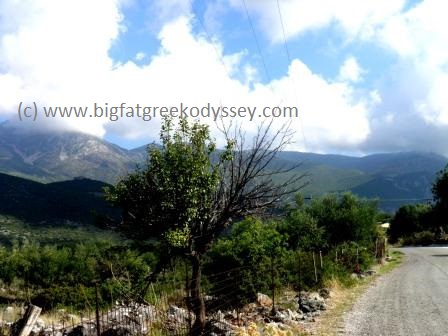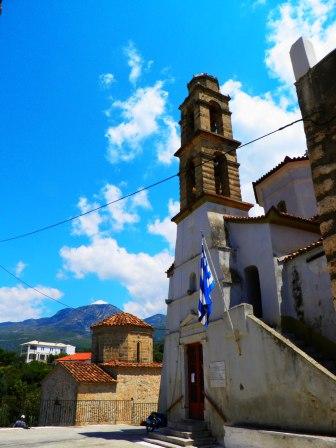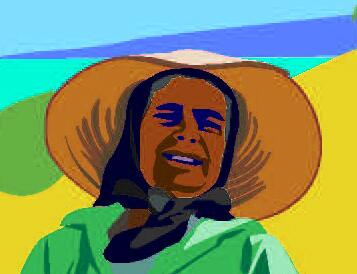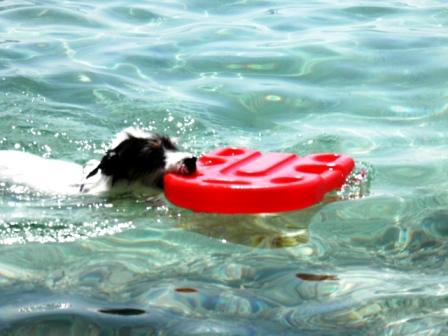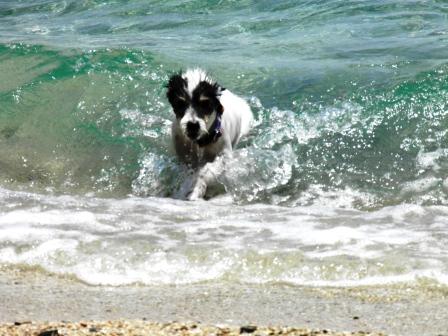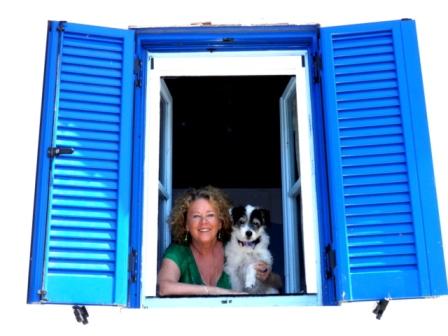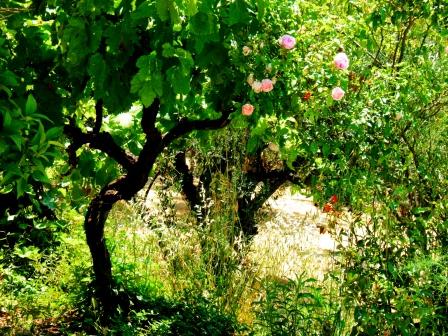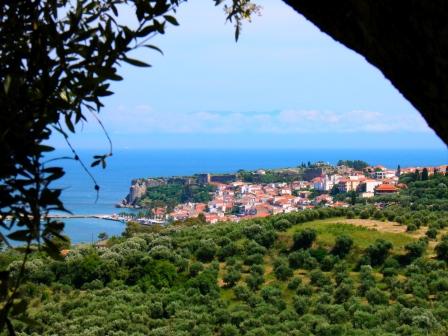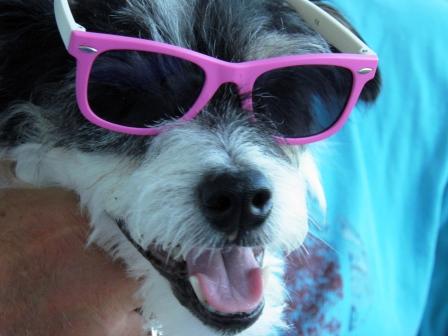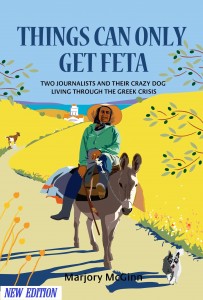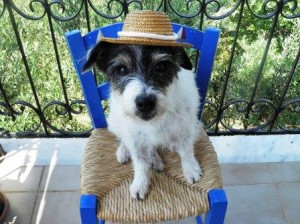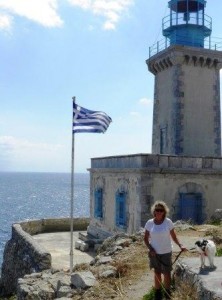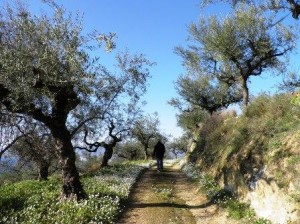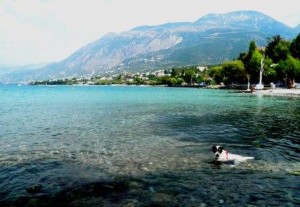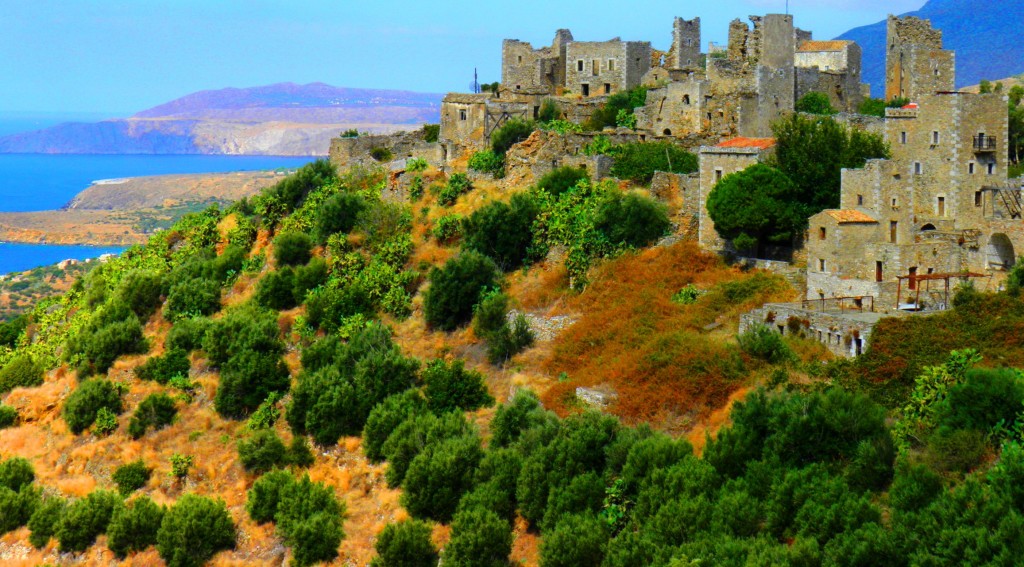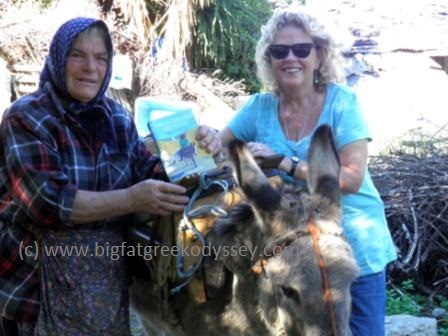
Foteini holds a copy of the book in which she is one of the starring characters, along with donkey Riko
RECENTLY we returned to the village of Megali Mantineia, in the Mani, where we spent the first year of our Greek Odyssey from 2010. It was also the place that inspired me to write the book Things Can Only Get Feta about our decision to live in the southern Peloponnese for a while.
Megali Mantineia is situated on a hillside, just south of Kalamata city, and beneath the towering Taygetos mountains. It hasn’t changed much in centuries and continues its rural traditions with olive harvesting and farming. As we turned off the main road with its big blue sign pointing to the village, I felt the same flutter of excitement I had on the first day of our original adventure because everything was just the way it was five years ago.
When we drove up to see our farming friend Foteini at her ktima, farm compound, we weren’t sure if she’d be there and she doesn’t carry anything as modern as a mobile phone. But straight away we saw her small donkey Riko, tied up under an olive tree beside his old feta tin, filled with water. Moments later, Foteini came bounding up to the front gates, looking much as she always did in a big plaid shirt, an apron and wellies. She threw her arms around us in turn, wanting to know how long we’d be staying and eager to catch up on our news.
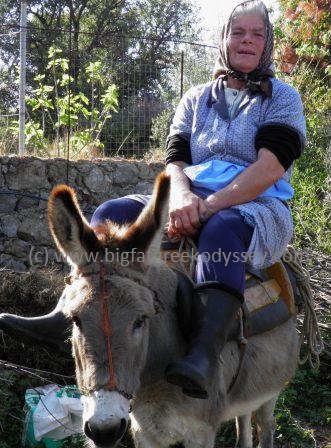
Foteini is often described as a ‘traditional woman’ because few older Greeks live her kind of rural life any more
We followed her down to her ‘kafeneio’, the ramshackle spot I often described in the book, a place with an old shed, a shaky table and chairs, and trees patrolled by hornets and wasps. Though in winter there’s not too many of them, fortunately. We sat in the sun and drank Greek coffee from small white cups and again I felt as if the intervening year we had spent back in Scotland hadn’t happened at all, and that we had always been here.
When I gave her a copy of Things Can Only Get Feta she sat with it in her hands, admiring the cover illustration of her riding Riko, with Wallace our Jack Russell trailing behind on a dusty village road. It’s a lovely image by London artist Tony Hannaford (see note below) and Foteini is very recognisable on the cover. She had seen the cover last year when a story about the book appeared in one of Kalamata’s newspapers, the Tharros, and it delighted and amused all the other villagers as well to now have a ‘rural star’ (Foteini) in their midst. Though of course, this isn’t her real name. I changed the names in the book to protect people’s privacy. But everyone knows Foteini. She’s priceless!
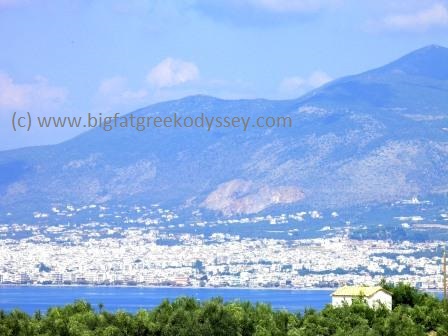
The view from the edge of Megali Mantineia towards the city of Kalamata, spread along the gulf of Messinia
Foteini is a unique character and with the help of my rusty Greek I’d had an unusual friendship with her from the beginning. It was one of cultural differences that challenged all my assumptions about life but I was drawn to her stoical character and her story, as I was to many of the other villagers. I never thought, however, when we first met the irrepressible Foteini, riding her donkey along the village road, that five years later we would still be in touch with her and that I would have exchanged letters, cards and even called her from Scotland on several occasions to see how things were going. “When are you coming back?” was her usual question.
Now that we were finally back on her farm I asked her how it felt to know that so many people around the world had now read about her and were interested in her rural life? Her pale blue eyes simply looked at me uncomprehending. “Really?” she finally said, but I knew my question meant little to her and it made me smile.
How rare a thing it is, in this slick internet world, to meet someone who knows nothing about the customs and taste of people beyond this southern region of Greece. Although she had a village education and can read and write and is wise to rural life, she has read few books and has no concept of the media, the publishing industry or publicity.
I told her that in a very small way, she was kind of ‘famous’. I don’t think she really understood this concept either. But her eyes danced with mirth as she gazed at the book cover, and that was good enough for me. I almost envied the monastic simplicity of her life in this glorious setting, which is something that won’t last forever, and one of the reasons our time in this region was so precious to us.
We didn’t have much time to spend with her, as we are staying in a different part of the southern Peloponnese, and we only had a few hours in the village, and other friends to see, but we will be heading back to the Mani again before too long.
We also visited the delightful Eftihia and her brother Yiorgos, who also featured in the book and were amongst the warmest people in the village. Eftihia (meaning happiness) is not her real name and most names were changed for the book, but it suits her big personality exactly. She bear-hugged us and took us inside for a big plate of delicious, home-made olive oil biscuits and we spent a long time in her cosy kitchen catching up on village gossip. Yiorgos was away for the day with a harvesting gang working on his olive groves.
Eftihia told me that while nothing very obvious had changed in the village since we left, sadly, everyone had felt the effects of the crisis with all the new farming and property taxes, and there was a general complaint that their earnings, however small, go straight to the government with little left to spend which is the same all over the country and one reason the economy has stalled in the past few years.
People are now living off the land, she told me, growing their own food and keeping animals. There is no light at the end of the tunnel for many of these hard-working people and many villagers who had earned money previously doing building, painting or gardening work in the area now have no jobs. The Greek clients have tightened their belts and many of the expats, who had built houses here and employed Greek workers, are selling up and returning to the UK.
But the price of olive oil has gone up this year from 2 euros a litre to around 4 euros, partly due to a bumper crop and the fact that the harvests in Spain and Italy have been disastrous. As one taverna owner told me: “Just for once Greece is claiming a small victory over other Mediterranean countries.” It couldn’t have come soon enough.
The bumper price for oil this year is good news for most of the villagers in Megali Mantineia who all have olive orchards on the edge of the village, and many earn the bulk of their income from the harvest.
Yiorgos and his gang returned in good spirits in the afternoon and sat in the sun eating a late lunch and toasting the results of the day’s labours with small glasses of home-made wine. There was family here, villagers and friends, and that’s the most heart-warming thing about Greece that when things get tough, people pitch in and help each other. It has always been this way, and that fact of life is never likely to change.
Greece at a stroke
MANY people have commented on the lovely cover of Things Can Only Get Feta and thanks must go to the artist who created it, London-based Tony Hannaford, who has a particular love for Greece and its islands. You can see his collection of Mediterranean-inspired artwork on his website www.anthonyhannaford.co.uk
For details about the book and where to buy it and for reviews and articles, please visit our Big Fat Greek Odyssey website, book page
Visit Amazon to buy the book (Kindle version – new edition). A new edition of the paperback will also be available shortly.
If you like the book please think about leaving a review on Amazon. It will be very much appreciated.
Thanks for stopping by.
© All rights reserved. Text and photographs copyright of the authors 2014. No content/text or photographs may be copied from the blog without the prior written permission of the authors. This applies to all posts on the blog.


